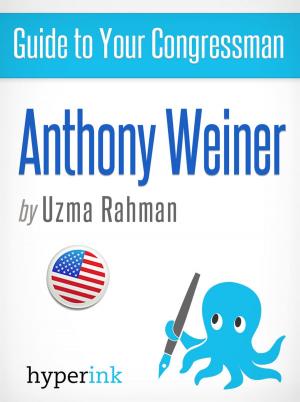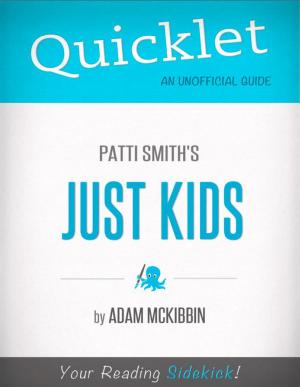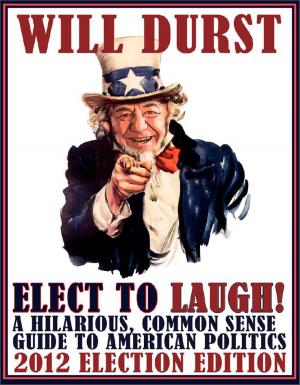Quicklet on George Orwell's 1984
Nonfiction, Reference & Language, Study Aids, Book Notes, Art & Architecture, General Art| Author: | Tiffanie Wen | ISBN: | 9781614646754 |
| Publisher: | Hyperink | Publication: | July 30, 2012 |
| Imprint: | Hyperink | Language: | English |
| Author: | Tiffanie Wen |
| ISBN: | 9781614646754 |
| Publisher: | Hyperink |
| Publication: | July 30, 2012 |
| Imprint: | Hyperink |
| Language: | English |
ABOUT THE BOOK
Few novels have influenced the way generations of readers shaped their understanding of society as much as George Orwell’s 1984, or added as many terms to the English lexicon: Big Brother, doublethink, Room 101, and thoughtcrime, to name a few. Even the term “Orwellian” invokes an immediate sense of caution against a repressive totalitarian regime who monitors our every move and manipulates the masses for its own gain.
Published by British publisher Secker and Warburg in 1949, only one year before the author’s death, 1984 is one of the most popular English novels of all time and has been translated into over 65 languages.
In 2005, Time Magazine listed 1984 as one of the best English-language novels since 1923.
According to banned-books.org.uk, the novel was banned in the USSR for its criticisms of Stalin’s regime. It was also banned in Florida for its communist and sexual content.
EXCERPT FROM THE BOOK
For the first time in the novel, Winston is not alone.
Chapter 3
The next time Winston and Julia meet is a couple weeks later in a belfry of a deserted church. Winston discovers that Julia is 26, works in the Fiction Department at the Ministry of Truth (at one point she even worked on Porncsec, creating cheap porn for Proles), lost her virginity at 16, and hates the Party, in a kind of superficial, rebellious-youth kind of way.
In turn, Winston tells Julia about his wife Katharine, how she made sex unbearable, and how on one occasion, he was tempted to kill her by pushing her over a cliff. When Julia asks him if he regretted not doing it, Winston tells her it doesn’t make a difference. He says, “In this game we’re playing, we can’t win.”
Julia is annoyed by Winston’s fatalist attitude, dismisses his talk about dying and makes plans to meet again.
—
In chapter 3, two important distinctions are made between Winston’s deep-rooted rebellion against the Party, and Julia’s more superficial one. While Winston dreams of an organized rebellion led by the Brotherhood and backed in real numbers by the Proles, Julia’s ideal is to simply living under the Party while taking as many liberties as possible, since an organized rebellion would never work. While Winston can vaguely remember a time before the Revolution, the young Julia has known nothing but Party rule and rebels against its doctrines like a teenager rebelling against his parents.
“Except when it touched upon her own life she had no interest in Party doctrine...She had never heard of the Brotherhood, and refused to believe in its existence. Any kind of organized revolt against the Party, which was bound to be a failure, struck her as stupid. The clever thing was to break the rules and stay alive all the same...” (131).
In this chapter we also see a distinction between Winston’s fatalistic attitude and Julia’s relatively optimistic one. Whenever Winston expresses his belief that their actions against the Party mean they are as good as dead, Julia can’t understand his apparent decision to give up on life as it is. Though she understands the ramifications of betraying the Party, Julia still refuses to accept defeat in her daily life.
“In a way she realized that she herself was doomed, that sooner or later the Thought Police would catch her and kill her, but with another part of her mind she believed that it was somehow possible to construct a secret world in which you could live as you chose...
Buy the book to continue reading!
Follow @hyperink on Twitter!
Visit us at www.facebook.com/hyperink!
Go to www.hyperink.com to join our newsletter and get awesome freebies!
CHAPTER OUTLINE
Quicklet on George Orwell's 1984
George Orwell's 1984
+ About the Book
+ About the Author
+ Overall Summary
+ Chapter-by-Chapter Summary and Commentary
+ ...and much more
ABOUT THE BOOK
Few novels have influenced the way generations of readers shaped their understanding of society as much as George Orwell’s 1984, or added as many terms to the English lexicon: Big Brother, doublethink, Room 101, and thoughtcrime, to name a few. Even the term “Orwellian” invokes an immediate sense of caution against a repressive totalitarian regime who monitors our every move and manipulates the masses for its own gain.
Published by British publisher Secker and Warburg in 1949, only one year before the author’s death, 1984 is one of the most popular English novels of all time and has been translated into over 65 languages.
In 2005, Time Magazine listed 1984 as one of the best English-language novels since 1923.
According to banned-books.org.uk, the novel was banned in the USSR for its criticisms of Stalin’s regime. It was also banned in Florida for its communist and sexual content.
EXCERPT FROM THE BOOK
For the first time in the novel, Winston is not alone.
Chapter 3
The next time Winston and Julia meet is a couple weeks later in a belfry of a deserted church. Winston discovers that Julia is 26, works in the Fiction Department at the Ministry of Truth (at one point she even worked on Porncsec, creating cheap porn for Proles), lost her virginity at 16, and hates the Party, in a kind of superficial, rebellious-youth kind of way.
In turn, Winston tells Julia about his wife Katharine, how she made sex unbearable, and how on one occasion, he was tempted to kill her by pushing her over a cliff. When Julia asks him if he regretted not doing it, Winston tells her it doesn’t make a difference. He says, “In this game we’re playing, we can’t win.”
Julia is annoyed by Winston’s fatalist attitude, dismisses his talk about dying and makes plans to meet again.
—
In chapter 3, two important distinctions are made between Winston’s deep-rooted rebellion against the Party, and Julia’s more superficial one. While Winston dreams of an organized rebellion led by the Brotherhood and backed in real numbers by the Proles, Julia’s ideal is to simply living under the Party while taking as many liberties as possible, since an organized rebellion would never work. While Winston can vaguely remember a time before the Revolution, the young Julia has known nothing but Party rule and rebels against its doctrines like a teenager rebelling against his parents.
“Except when it touched upon her own life she had no interest in Party doctrine...She had never heard of the Brotherhood, and refused to believe in its existence. Any kind of organized revolt against the Party, which was bound to be a failure, struck her as stupid. The clever thing was to break the rules and stay alive all the same...” (131).
In this chapter we also see a distinction between Winston’s fatalistic attitude and Julia’s relatively optimistic one. Whenever Winston expresses his belief that their actions against the Party mean they are as good as dead, Julia can’t understand his apparent decision to give up on life as it is. Though she understands the ramifications of betraying the Party, Julia still refuses to accept defeat in her daily life.
“In a way she realized that she herself was doomed, that sooner or later the Thought Police would catch her and kill her, but with another part of her mind she believed that it was somehow possible to construct a secret world in which you could live as you chose...
Buy the book to continue reading!
Follow @hyperink on Twitter!
Visit us at www.facebook.com/hyperink!
Go to www.hyperink.com to join our newsletter and get awesome freebies!
CHAPTER OUTLINE
Quicklet on George Orwell's 1984
George Orwell's 1984
+ About the Book
+ About the Author
+ Overall Summary
+ Chapter-by-Chapter Summary and Commentary
+ ...and much more















